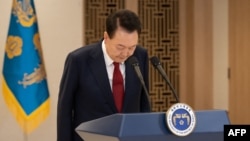South Korea’s most recent encounter with martial law may have only lasted a few hours, but for many South Korean journalists already facing growing harassment under President Yoon Suk Yeol’s government, the threat was deeply unsettling.
Yoon’s decree late last Tuesday declared "all media and publishing [to be] under the control of Martial Law Command," evoking memories of South Korea’s past military dictatorships, with their strict media censorship.
Though lawmakers overturned the decree, forcing Yoon to lift it within hours, South Korean journalists who spoke to VOA described moments of late-night panic, with many concerned they would become targets of martial law forces.
One broadcaster, a prominent Yoon critic, said he went into hiding after martial law troops were seen outside his office. Another, who already faced defamation charges over his reporting on Yoon, recounted huddling with colleagues, bracing for what they feared was imminent arrest. At least one journalist reported being threatened with a taser by military police.
The events marked a dramatic escalation of Yoon’s combative stance toward the media, which in some ways had already reached levels unprecedented in South Korea’s democratic history. A VOA investigation last year found that Yoon pursued criminal defamation charges against journalists and media outlets at a record pace.
As investigators probe the failed martial law attempt as part of a treason inquiry into Yoon, many questions remain about the extent of his intentions.
On Thursday, Yoon insisted he did not intend for the decree to result in violence, instead framing it as a "strong message" to his political opponents, whom he described as North Korea sympathizers and anti-state forces.
However, there is emerging evidence to suggest Yoon’s martial law forces were meant to target at least some media outlets and journalists who were critical of his conservative government.
Soon after the decree went into effect, Kim Ou-joon, a liberal broadcaster and fierce Yoon critic, posted footage showing about 20 armed soldiers standing outside his office in central Seoul.
Kim, whose YouTube channel has about 1.7 million subscribers, said he went into hiding, fearing for his life.
"It was an extremely urgent situation, and everyone panicked," said Kim, who spoke to VOA on Wednesday as his personal guards stood watch outside his office.
Kim had for months discussed on his show rumors about Yoon declaring martial law, even as other more mainstream commentators dismissed it as a far-fetched political smear.
"Yoon probably views the military dictatorship era as having an ideal media environment, and he wanted to return to that period, which is why he considered martial law," Kim said.
At least two South Korean newspapers reported that Yoon had instructed Cho Ji-ho, the commissioner-general of the Korean National Police Agency, to occupy several organizations, including MBC, one of the country’s largest broadcasters, which has also been the target of defamation charges by Yoon and his ruling party.
There is no evidence that martial law forces ever visited MBC facilities. Nevertheless, in a statement, MBC’s labor union condemned the alleged MBC takeover plan as "truly crazy," saying it had exposed the "true face" of Yoon.
During the short-lived martial law attempt, fear extended beyond newsrooms, reaching even the reporters who were covering the developments at the defense ministry, which is directly opposite Yoon's office.
Kwon Hyuk-cheol, a defense correspondent for the left-leaning Hankyoreh newspaper, was working a night shift when martial law was declared. About 20 minutes after the decree went into effect, military police at the ministry ordered journalists to leave the press room. When he refused, an officer who claimed to be "just following orders" threatened to use his taser, Kwon told VOA.
Meanwhile, in the nearby office of Newstapa, an online newspaper, Han Sang-jin and his colleagues gathered in fear of arrest.
"We knew that if armed soldiers came for us, there was no way to resist," said Han, who was indicted in July on defamation charges after his home and office were raided by prosecutors last year. "We were about to accept our fate."
In the end, no arrests or violence occurred during the six-hour ordeal and no media were placed under control of the military. But Han noted the decree marked an unprecedented escalation.
While the previous 1980 martial law decree subjected media coverage to censorship, Yoon’s order aimed to place all media entirely under military control, Han said.
"Censorship only targets specific articles, but control implies the government could take over the entire operation of a media organization," he explained.
Yoon’s decree also banned "fake news" and "manipulation of public opinion"—terms that Kim believes were aimed at bolstering unfounded claims, including far-right allegations that April’s liberal landslide in the legislative election was fraudulent.
Before his arrest this week, Yoon’s former defense minister, Kim Yong-hyun, who is suspected of involvement in the martial law attempt, told Korean media that martial law troops were sent to the country’s election commission to assess voter fraud claims.
In a hearing this week, the head of South Korea’s special warfare command revealed that Yoon also ordered him to forcibly remove lawmakers from the National Assembly and cordon off key sites, including the legislative building, the opposition party headquarters, and the office of the YouTuber, Kim Ou-joon.
The developments are expected to further damage South Korea’s global reputation for press freedom, which has already been in sharp decline, according to media watchdogs.
In the 2024 World Press Freedom Index, released in May by Reporters Without Borders, known by its French language acronym, RSF, South Korea ranked 62nd out of 180 nations, a drop of 15 spots from the previous year.
Following Yoon’s martial law attempt, South Korea’s National Union of Media Workers, which represents 15,000 journalists and media members, said it will no longer refer to Yoon as president.
"The recent insurrection was clearly unconstitutional," said Yun Chang-hyun, the group’s chairman, "which led us to believe that he lost his presidential qualification."






